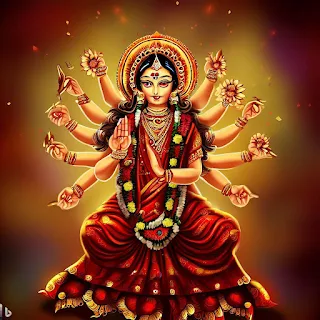Chaitra Navratri is a Hindu festival that is celebrated with great fervor and devotion in the month of Chaitra, which falls in March or April according to the Gregorian calendar. The festival is celebrated for nine days, and it marks the beginning of the Hindu New Year. Navratri means "nine nights" in Sanskrit, and during this festival, devotees worship Goddess Durga and her various forms.
Significance of Chaitra Navratri Chaitra Navratri is an important festival for Hindus, and it holds a lot of significance in Hindu mythology. According to Hindu scriptures, it is believed that during this time, the Goddess Durga descends on Earth to rid it of evil forces and to bless her devotees with happiness, prosperity, and good health. Devotees offer prayers and perform various rituals to please the Goddess and seek her blessings during this festival.
Difference between Chaitra Navratri and Sharad Navratri There are two main Navratri festivals celebrated in India - Chaitra Navratri and Sharad Navratri. The major difference between the two is the time of the year when they are celebrated. Chaitra Navratri is celebrated in the Hindu month of Chaitra, which falls in March or April, while Sharad Navratri is celebrated in the month of Ashwin, which falls in September or October. Chaitra Navratri marks the beginning of the Hindu New Year, while Sharad Navratri is celebrated during the month of Sharad or autumn.
History of Chaitra Navratri According to Hindu mythology, Chaitra Navratri celebrates the victory of Lord Rama over the demon king Ravana, who had abducted Rama's wife Sita. Lord Rama, along with his brother Lakshmana and the monkey god Hanuman, had waged a war against Ravana to rescue Sita. The battle lasted for nine days, and Lord Rama emerged victorious on the tenth day, which is celebrated as Vijayadashami or Dussehra.
Do's and Don'ts during Chaitra Navratri During Chaitra Navratri, devotees observe fasts and offer prayers to the Goddess Durga. Here are some do's and don'ts that one should keep in mind during this festival:
Do's:
- Observe fasting: Fasting is an important aspect of Navratri. You can choose to fast for all nine days or select specific days based on your convenience and beliefs. The most common type of fast is to eat only one meal a day and avoid grains, onion, garlic, and non-vegetarian food.
- Worship the Goddess: Devotees worship the nine forms of Goddess Durga during Navratri. It is important to offer prayers to the deity and perform aarti.
- Wear traditional attire: Navratri is a festive occasion, and it is customary to dress up in traditional attire. Men can wear kurta-pajama or dhoti-kurta, while women can wear sarees, lehengas or salwar kameez.
- Practice charity: It is considered auspicious to help the needy during Navratri. You can donate money, food, or clothes to the less fortunate.
- Play Garba and Dandiya: Garba and Dandiya are traditional folk dances performed during Navratri. You can participate in these dances and enjoy the festive spirit.
Don'ts:
- Avoid non-vegetarian food: Non-vegetarian food is strictly prohibited during Navratri. It is believed that consuming non-vegetarian food during this time can disturb the equilibrium of the body and mind.
- Refrain from alcohol and smoking: Consumption of alcohol and smoking are also considered as sins during Navratri. It is believed that indulging in such activities can lead to bad karma.
- Do not indulge in arguments: Navratri is a time to seek blessings and meditate. Avoid getting into arguments or conflicts with anyone during this period.
- Do not wear black: Black is considered inauspicious during Navratri. Avoid wearing black-colored clothes, as they are believed to attract negative energy.
- Do not disrespect the Goddess: It is essential to respect the deity during Navratri. Avoid indulging in activities that are disrespectful to the Goddess, like using foul language or engaging in immoral activities.

